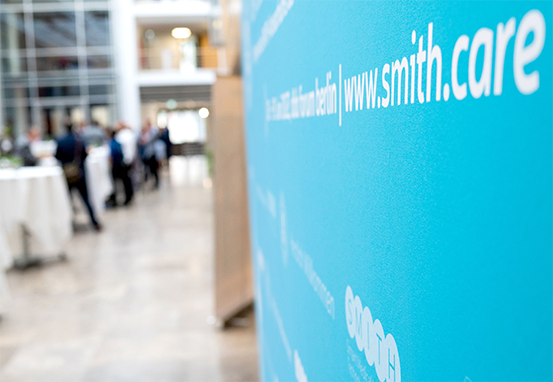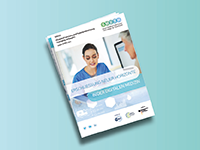
About SMITH
Sustainably improving Clinical Research and Patient Care
The large amounts of data in clinical information systems have enormous potential for tomorrow’s healthcare. Re-use, consolidation, and analysis of medical data from routine care will drive the development of new and improved treatments, medicines, and technologies. This is where the Smart Medical Technology for Healthcare (SMITH) Consortium comes in. As part of the Medical Informatics Initiative (MII), SMITH has created a shared infrastructure that brings together disparate sources of patient care data. This data is linked across sites and made available for medical research. SMITH’s work addresses the current challenges of digitalization and the introduction of e-health measures in the healthcare sector. In the future, diagnoses, medications, and treatments will be better tailored to patients. Privacy and data security are top priorities.

Interdisciplinary Cooperation and Collaboration
The SMITH Consortium brings together clinical, epidemiological, medical, and informatics experts.
The consortium consists of eleven medical university partners and ten Data Integration Centers.
The goal is to digitally network patient data, generated during a hospital stay, across sites to strengthen clinical research and customize patient care.
Linking research and care data across sites
The university hospitals in Aachen, Bonn, Essen, Halle, Hamburg, Jena and Leipzig, which are part of the consortium, have established central technological interfaces, so-called Data Integration Centers, to link data from healthcare and research. The basic technical requirements for this are currently created at the partner sites in Düsseldorf, Rostock and Bochum. The Data Integration Centers will use internationally standardized communication and security procedures to process the data generated in everyday clinical practice and make it available to medical research in a harmonized form. In this way, the Data Integration Centers create the conditions for secure and data-protection compliant access to high-quality data from routine care. Conversely, the centers enable research findings to be fed back into healthcare. The entire process of data use always requires the informed consent of patients to use their data for research purposes.
Concrete applications create added value for clinical care
During the development and networking phase of the Medical Informatics Initiative (2018 – 2022), the functionality and efficiency of the established Data Integration Centers were tested using two clinical and one methodological use case. The methodological Use Case PheP provided tools for structuring and evaluating medical data in accordance with data protection regulations. The clinical Use Case ASIC developed an application to support intensive care medicine, while the HELP Use Case was dedicated to improving infectious disease medicine through an IT solution.
A central goal of the current consolidation and extension phase from 2023 to 2026 is to transfer the solutions successfully demonstrated in the Medical Informatics Initiative to other clinics or research institutions. The data infrastructure established in previous years will be further tested and expanded in cross-consortium use cases. In addition to the SMITH Consortium, the MII consortia DIFUTURE, HiGHmed and MIRACUM are involved in these application-oriented projects. The SMITH Office has taken over the supporting coordination of the cross-consortium projects GeMTeX and INTERPOLAR. GeMTeX aims to make medical texts from patient care available for research. INTERPOLAR develops IT solutions to improve the safety of drug therapy.
In order to provide researchers with centralized and secure access to the data provided by the Data Integration Centers of the MII, all Data Integration Centers are connected to the German Portal for Medical Research Data (FDPG). The FDPG serves as a point of contact for researchers planning a project with routine data from German (university) medicine. Among other things, they can check the feasibility of specific research questions and request data as well as biospecimens. In addition, the FDPG coordinates the provision of data by the Data Integration Centers and provides support in securing the contractual use of data.
Training enables use of new digital infrastructure
To strengthen digital literacy in the healthcare sector, SMITH supported the expansion of medical informatics research and teaching during the last phase of funding. As part of SMITH, a total of six professorships, three degree programs and four junior research groups with a focus on medical informatics have been established at the partner locations. The SMITH Academy and other SMITH educational programs offered courses and learning materials for the further qualification of project staff and clinician scientists.
Building on the experience of the SMITH Academy, the MII Academy learning portal was launched in the spring of 2024. At the MII Academy, clinician scientists learn how to use routine care data for their research across sites. Through video-based learning units, researchers are empowered to use the established structures of the Medical Informatics Initiative. The MII Academy was developed with support from the SMITH Office as part of the consolidation and extension phase of the MII.
Flyer SMITH Consortium
Status: 11/2023
About the Medical Informatics Initiative
SMITH is one of four consortia funded by the German Federal Ministry of Research, Technology and Space (BMFTR) as part of the Medical Informatics Initiative (MII). The goal of the Medical Informatics Initiative (MII) is to improve research opportunities and patient care through innovative IT solutions. These will enable the exchange and use of data from patient care and clinical and biomedical research across institutions and locations. In the development and networking phase (2018-2022), the German Federal Ministry of Education and Research (BMBF) funded the establishment of Data Integration Centers at university hospitals with more than 200 million euros. From 2023 to 2026, the BMFTR provides an additional 200 million euros to expand cooperation between university hospitals and to include new partners. Furthermore, the BMFTR is funding six “Digital Hubs: Advances in Research and Health Care” with around 50 million euros (2021-2025) as part of the MII. Their task is to integrate the pioneering work of university hospitals into other areas of the healthcare system, from outpatient care to rehabilitation and aftercare.


